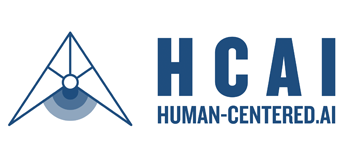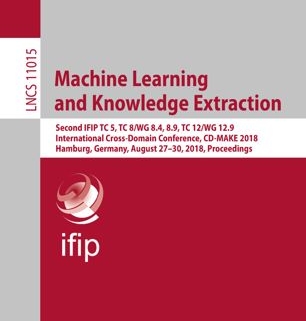“Machine Learning and Knowledge Extraction” 2nd CD-MAKE Volume just appeared
The second Volume of the Springer LNCS Proceedings of the IFIP TC 5, TC 8/WG 8.4, 8.9, TC 12/WG 12.9 International Cross-Domain Conference, CD-MAKE Machine Learning & Knowledge Extraction just appeared, see:
https://link.springer.com/book/10.1007/978-3-319-99740-7
>> Here the preprints of our papers:
[1] Andreas Holzinger, Peter Kieseberg, Edgar Weippl & A Min Tjoa 2018. Current Advances, Trends and Challenges of Machine Learning and Knowledge Extraction: From Machine Learning to Explainable AI. Springer Lecture Notes in Computer Science LNCS 11015. Cham: Springer, pp. 1-8, doi:10.1007/978-3-319-99740-7_1.
HolzingerEtAl2018_from-machine-learning-to-explainable-AI-pre (pdf, 198 kB)
[2] Randy Goebel, Ajay Chander, Katharina Holzinger, Freddy Lecue, Zeynep Akata, Simone Stumpf, Peter Kieseberg & Andreas Holzinger. Explainable AI: the new 42? Springer Lecture Notes in Computer Science LNCS 11015, 2018 Cham. Springer, 295-303, doi:10.1007/978-3-319-99740-7_21.
GOEBEL et al (2018) Explainable-AI-the-new-42 (pdf, 835 kB)
Here the link to the bookmetrix page:
https://www.bookmetrix.com/detail/book/38a3a435-ab77-4db9-a4ad-97ce63b072b3#citations
>> From the preface:
Each paper was assigned to at least three reviewers of our international scientific committee; after review and metareview and editorial decision they carefully selected 25 papers for this volume out of 75 submissions in total, which resulted in an acceptance rate of 33 %.
The International Cross-Domain Conference for Machine Learning and Knowledge Extraction, CD-MAKE, is a joint effort of IFIP TC 5, TC 12, IFIP WG 8.4, IFIP WG 8.9 and IFIP WG 12.9 and is held in conjunction with the International Conference on Availability, Reliability and Security (ARES).
IFIP – the International Federation for Information Processing – is the leading multinational, non-governmental, apolitical organization in information and communications technologies and computer sciences, is recognized by the United Nations (UN) and was established in the year 1960 under the auspices of UNESCO as an outcome of the first World Computer Congress held in Paris in 1959. IFIP is incorporated in Austria by decree of the Austrian Foreign Ministry (September 20, 1996, GZ 1055.170/120-I.2/96) granting IFIP the legal status of a non-governmental international organization under the Austrian Law on the Granting of Privileges to Non-Governmental International Organizations (Federal Law Gazette 1992/174).
IFIP brings together more than 3,500 scientists without boundaries from both academia and industry, organized in more than 100 Working Groups (WGs) and 13 Technical Committees (TCs). CD stands for “cross-domain” and means the integration and appraisal of different fields and application domains to provide an atmosphere to foster different perspectives and opinions.
The conference fosters an integrative machine learning approach, taking into account the importance of data science and visualization for the algorithmic pipeline with a strong emphasis on privacy, data protection, safety, and security.
It is dedicated to offering an international platform for novel ideas and a fresh look at methodologies to put crazy ideas into business for the benefit of humans. Serendipity is a desired effect and should lead to the cross-fertilization of methodologies and the transfer of algorithmic developments.
The acronym MAKE stands for “MAchine Learning and Knowledge Extraction,” a field that, while quite old in its fundamentals, has just recently begun to thrive based on both the novel developments in the algorithmic area and the availability of big data and vast computing resources at a comparatively low price.
Machine learning studies algorithms that can learn from data to gain knowledge from experience and to generate decisions and predictions. A grand goal is to understand intelligence for the design and development of algorithms that work autonomously (ideally without a human-in-the-loop) and can improve their learning behavior over time. The challenge is to discover relevant structural and/or temporal patterns (“knowledge”) in data, which are often hidden in arbitrarily high-dimensional spaces, and thus simply not accessible to humans. Machine learning as a branch of artificial intelligence is currently undergoing a kind of Cambrian explosion and is the fastest growing field in computer science today.
There are many application domains, e.g., smart health, smart factory (Industry 4.0), etc. with many use cases from our daily lives, e.g., recommender systems, speech recognition, autonomous driving, etc. The grand challenges lie in sense-making, in context-understanding, and in decisionmaking under uncertainty.
Our real world is full of uncertainties and probabilistic inference had an enormous influence on artificial intelligence generally and statistical learning specifically. Inverse probability allows us to infer unknowns, to learn from data, and to make predictions to support decision-making. Whether in social networks, recommender systems, health, or Industry 4.0 applications, the increasingly complex data sets require efficient, useful, and useable solutions for knowledge discovery and knowledge extraction.
We cordially thank all members of the committee, reviewers, authors, supporters and friends! See you in Hamburg:
 Image taken by Andreas Holzinger
Image taken by Andreas Holzinger



